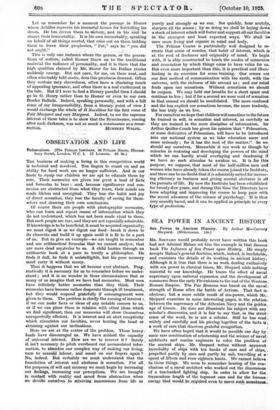OBSERVA:TION. AND LIFE
Pelmanism. (The Pelman Institute, 96 Pelman House, Blooms- bury Street, London, W.C. 1. 12 Lessons. £6 6s.) THE business of making a living in this competitive world is technical and involved. Ten fingers to count on and an ability for hard work are no longer sufficient. And in our haste to equip our children we are apt to educate them by rote. `Their memories are given too great a load of facts and formulas to bear : -and, because significance and con- nexion are abstracted from what they learn, their minds are made lifeless and unoriginal. They lose the habit and joy of direct sensation, they lose the faculty of seeing for them- selves and drawing their own conclusions.
Of course there are people with photographic memories, whO can learn and repeat reams of information which they do not understand, which has not been made vivid to them. But such people are rare, and they are not especially admirable. If knowledge is to be beneficial, it must be acquired organically; we must digest it as we digest our food—break it down to its elements and build it up again until it is fit to be a part of us. Bat to give an example—we are taught to remember and use arithmetical formulas that we cannot analyse, that are mere dead mysteries to us. A child hurries through an arithmetic book at a pace to terrify a philosopher. He finds it dull, he finds it unintelligible, but his poor memory must carry it without mercy.
Thus it happens that we all become over abstract. Prag- matically it is necessary for us to remember before we under- stand ; and it is no wonder in these circumstances that so many of us imagine that we have bad memories. Most men . have infinitely better memories than they think. Their memories have become rather desperate through ill treatment, ; but they would respond gratefully if encouragement were.
given to them. The problem is chiefly the rousing of interest . if we can make facts or ideas of any notable concern to us, or if we can place them in relation with other ideas which we find significant, then our memories will show themselves unexpectedly efficient. It is interest and an alert receptivity which stimulates our faculties, never beating the head or straining against our inclinations.
Here we are at the centre of the problem. Those heavy loads have discouraged us. We have mislaid the capacity of universal interest. How are we to recover it ? Surely , it isn't necessary to pitch overboard our accumulated infor- , mation, to abandon our complex way of making our living, turn to manual labour, and count on our fingers again ? No, indeed. But certainly we must understand that the foundation of interest and aleitness is sensation. For all : the purposes, of will and memory we must begin by increasing our feelings, increasing our perceptions. We are brought in contact with reality and saved from abstraction when we devai. ourselves to receiving impressions from life as
purely and strongly as we can. See quickly, hear acutely, sharpen all the senses ; by so doing we shall be laying down , a stock of interest which will foster and support all our faculties in the strangest and least expected ways. We shall be once more living and organic in mind and body.
The Pelman Course is particularly well designed to re- create that sense of wonder, that habit of interest, which is , at the root of freshness and originality of mind. To begin with, it is ably constructed to teachh, the modes of connexion -and association by which things come to have value for us. But even more important than this, it is practical and illum- inating in its exercises for sense training. Our senses are our first method of communication with the earth, with the universe, with the richness of life around us ; and our mind feeds upon our sensations. Without sensations we should be corpses. We may hold ours breaths for a short space and continue to live ; but if for a second we were void of sensation in that second we should be annihilated. The more confused and the less explicit our sensations become, the more leadenly, the less truly do we live.
For ourselves we hope that children will sometime in the future be trained in will, in sensation and interest, as carefully as they are trained in the mere discipline of information. Sir Arthur Quiller-Couch has given his opinion that " Pelmanism, or some derivative of Pelmanism, will have to be introduced into our national system as we take education more and more seriously ; for it has the root of the matter." So we- should say ourselves. Meanwhile it can work as though by miracles in restoring and developing the powers of the mind which we can hardly avoid overlaying and deadening if we have no such stimulus to awaken us. It is for this purpose, we suppose, that most of the half-million men and women who have already, taken the course joined the Institute, and there can be no doubt that it is admirably suited for increas- ing efficiency in business and giving mental alertness in all the pursuits of life. By now the Institute has been established for twenty-five years, and during this time the Directors have been adapting and improving the course to keep pace' with the recent advances of the science of psychology. - It is thus very soundly based, and it can be applied in principle to every type of profession.


























































 Previous page
Previous page